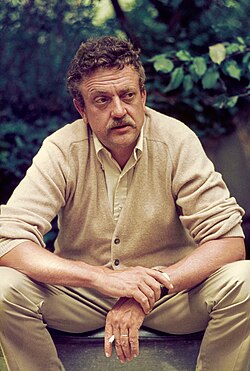Kurt Vonnegut Jr. Quote
Satan," he said, "couldn't undo anything God had done. She could at least try to make existence for His little toys less painful. She could see what He couldn't: To be alive was to be either bored or scared stiff. So she filled an apple with all sorts of ideas that might at least relieve the boredom, such as rules for games with cards and dice, and how to fuck, and recipes for beer and wine and whiskey, and pictures of different plants that were smokeable, and so on. And instructions on how to make music and sing and dance real crazy, real sexy. And how to spout blasphemy when they stubbed their toes."Satan had a serpent give Eve the apple. Eve took a bite and handed it to Adam. Hee took a bite, and then they fucked.
Satan," he said, "couldn't undo anything God had done. She could at least try to make existence for His little toys less painful. She could see what He couldn't: To be alive was to be either bored or scared stiff. So she filled an apple with all sorts of ideas that might at least relieve the boredom, such as rules for games with cards and dice, and how to fuck, and recipes for beer and wine and whiskey, and pictures of different plants that were smokeable, and so on. And instructions on how to make music and sing and dance real crazy, real sexy. And how to spout blasphemy when they stubbed their toes."Satan had a serpent give Eve the apple. Eve took a bite and handed it to Adam. Hee took a bite, and then they fucked.
Related Quotes
Not a believer in the mosque am I,Nor a disbeliever with his rites am I.I am not the pure amongst the impure,I am neither Moses nor Pharaoh.Bulleh, I know not who I am.Not in the holy books am I,Nor d...
About Kurt Vonnegut Jr.
Born and raised in Indianapolis, Vonnegut attended Cornell University, but withdrew in January 1943 and enlisted in the U.S. Army. As part of his training, he studied mechanical engineering at the Carnegie Institute of Technology and the University of Tennessee. He was then deployed to Europe to fight in World War II and was captured by the Germans during the Battle of the Bulge. He was interned in Dresden, where he survived the Allied bombing of the city in a meat locker of the slaughterhouse where he was imprisoned. After the war, he married Jane Marie Cox. He and his wife both attended the University of Chicago while he worked as a night reporter for the City News Bureau.
Vonnegut published his first novel, Player Piano, in 1952. It received positive reviews yet sold poorly. In the nearly 20 years that followed, several well regarded novels were published, including The Sirens of Titan (1959) and Cat's Cradle (1963), both of which were nominated for the Hugo Award for best science fiction or fantasy novel of the year. His short-story collection, Welcome to the Monkey House, was published in 1968.
Vonnegut's breakthrough was his commercially and critically successful sixth novel, Slaughterhouse-Five (1969). Its anti-war sentiment resonated with its readers amid the Vietnam War, and its reviews were generally positive. It rose to the top of The New York Times Best Seller list and made Vonnegut famous. Later in his career, Vonnegut published autobiographical essays and short-story collections such as Fates Worse Than Death (1991) and A Man Without a Country (2005). He has been hailed for his darkly humorous commentary on American society. His son Mark published a compilation of his work, Armageddon in Retrospect, in 2008. In 2017, Seven Stories Press published Complete Stories, a collection of Vonnegut's short fiction.
